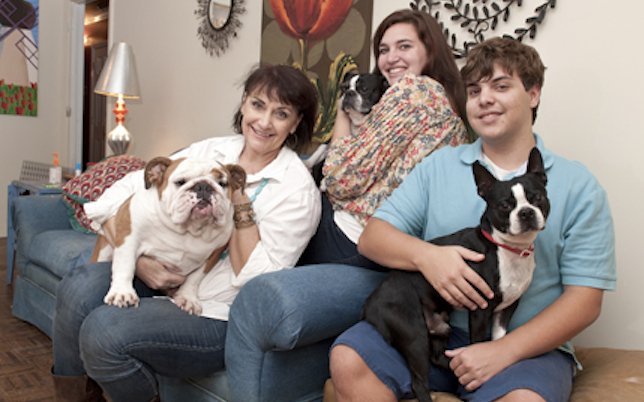Jackson resident and pancreas transplant recipient Nancy Smith, left, holding the family bulldog Crash, is all about her children: Braeden, (center), cuddling Rowdy; and Carruth, with Chaos.
On Sept. 30, diabetic Nancy Smith became the first person in the state to receive an isolated pancreas transplant at the University of Mississippi Medical Center. Smith, 52, did not receive the more medically common combination of a pancreas and kidney, but a pancreas alone.
Smith's surgery marks the 10th transplant of a pancreas at UMMC this year, putting the hospital's transplant program on par with other acclaimed programs in the Southeast. Dr. Mark Earl, an assistant professor of surgery at UMMC, performed the transplant. His expertise includes all aspects of liver and pancreas surgery and transplant.
"It's an incredibly rare procedure," Earl said in a press release from UMMC. "It's especially rare for someone who has no kidney failure, but has other life-threatening complications from type 1 diabetes."
Diagnosed with diabetes as a child, Smith said she and her doctors knew it would be a matter of time before she'd need a transplant. Because Smith's pancreas wasn't producing insulin and couldn't regulate her blood sugar levels, her blood sugar was unpredictable and would drop without warning, causing her to pass out.
Before the surgery, Smith had tried to do all the right things: Frequently exercise. watch her diet and weight, pray and try not to fret about the future.
"If I could stay calm and not worry about things as much, that would help," Smith said in the press release. "I wouldn't be here today if I didn't exercise like I do."
However, despite her best efforts her health continued to deteriorate. She lost sight in one eye, her neuropathy was worsening and her quality of life was waning.
In July 2013, Smith secured a place on the transplant waiting list at Ochsner Medical Center in New Orleans right before UMMC's transplant program began performing pancreas-kidney procedures.
"They had to take me off the waiting list at Ochsner because I couldn't find anyone who could go to New Orleans and stay there three months with me," Smith said.
In January, Smith met with Dr. Kenneth Kokko, an associate professor of nephrology and member of UMMC's transplant team. Dr. Earl came in during the meeting and told Smith that she would be the first person to receive a pancreas transplant. Earl later called Smith on Sept. 24 to tell her that UMMC found a donor pancreas. Smith immediately headed to UMMC, only to find out that the pancreas wasn't viable for transplant. Just days later, Earl summoned Smith again with news of a potential pancreas.
Over the course of the three-hour operation, Dr. Earl left Smith's native pancreas alone; it worked well except for the lack of insulin production. The donated pancreas produced crucial insulin, which stimulates cells to absorb sugar from the blood.
Smith had a 30-percent risk of needing to go back into surgery during the first week. There was also a 10-percent chance that the blood supply to the new pancreas could become blocked during the first six weeks. After the successful surgery, Dr. Earl sent Smith home just five days after she got her new pancreas.
"Everything's a miracle," said Smith, who wants to help people understand the importance of organ donation. "When I woke up from surgery, I didn't have diabetes. Now I can see shapes and some other things out of my right eye. I've never had ... normal blood sugars this many days in a row."
Dr. Earl and his staff are now watching Smith carefully, taking frequent blood work and making sure she regularly checks her blood sugar. As Smith's recovery continues, Earl said, so does her prospect of a long and healthy life.
Smith's son, Carruth, is an 18-year-old high school senior and her daughter, Braeden, 23, is a college graduate and preschool teacher. Carruth copes with the challenges of Asperger's Syndrome, a form of autism, and a rare neuropsychiatric disorder associated with strep infections.
"They made the decision easy. I want to watch them continue to grow, and to be around for all the major life events to come," Smith said. "He needs me, and so does she. Nobody is like a mama."
More stories by this author
- New CSET Atrium Dedication and College of Business Donation at JSU, MSU ERDC Day
- JSU Commencement Speakers, National Academy of Inventors Chapter and Marc E. Bassy at MSU
- JSU Getty Images Donation, MSU Research Week and Give Wing at USM
- Alumni Enrichment Institutes an MS Got Soul at JSU, State Science Fair at USM
- JSU Blue Tie Gala and Regions Card, MSU Virtual Reality Grant


